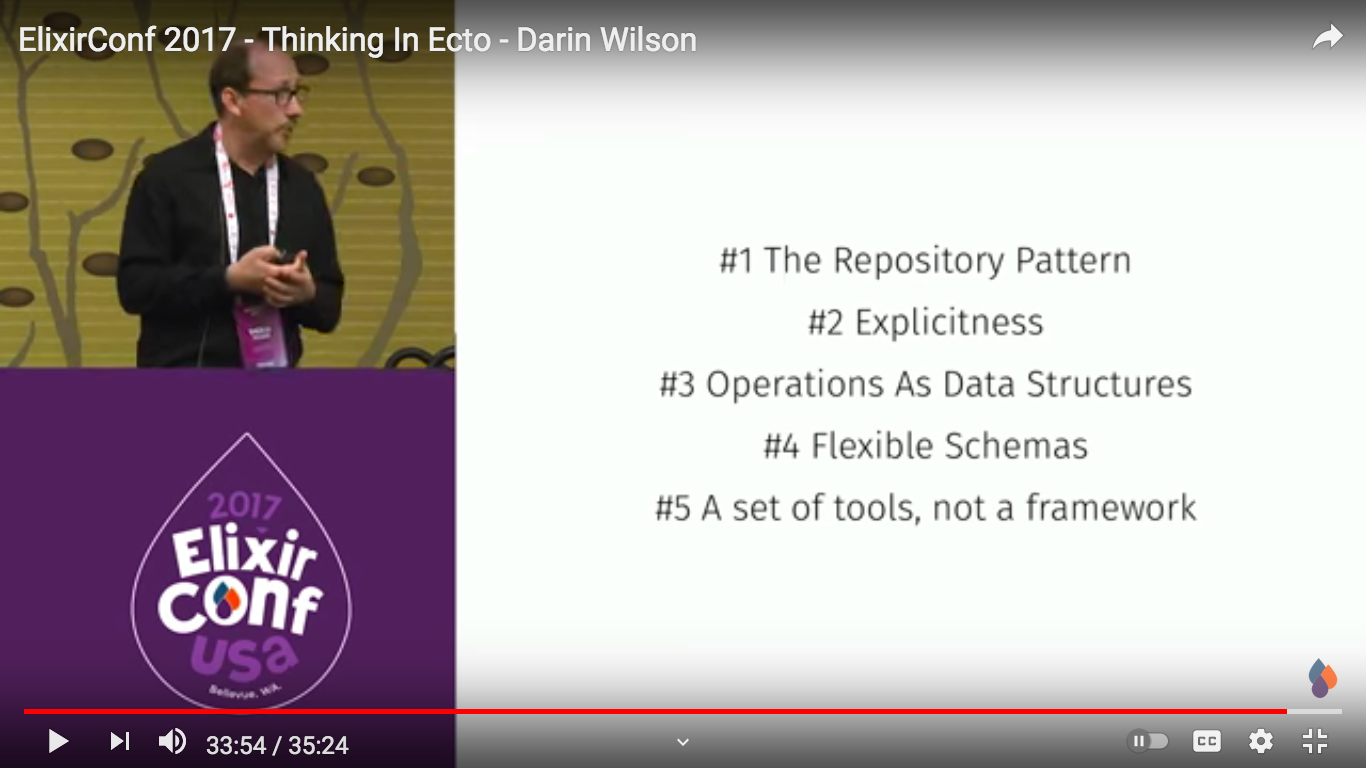
You need to add both Ecto and the database adapter as a dependency to your mix.exs file.
Elixir ecto free#
The Little Ecto Cookbook, a free ebook by Dashbit, which is a curation of the existing Ecto guides with some extra contents Programming Ecto, by Darin Wilson and Eric Meadows-Jönsson, which guides you from fundamentals up to advanced concepts

See the getting started guide and the online documentation for more information. Ecto is also commonly used to map data from any source into Elixir structs, whether they are backed by a database or not.

all end endĮcto is commonly used to interact with databases, such as PostgreSQL and MySQL via ( source code). all ( query ) end def pipe_query do Weather |> where ( city: "Kraków" ) |> order_by ( :temp_lo ) |> limit ( 10 ) |> Repo. def keyword_query do query = from w in Weather, where: w.
Elixir ecto code#
# In your config/config.exs file config :my_app, ecto_repos: config :my_app, Sample.Repo, database: "ecto_simple", username: "postgres", password: "postgres", hostname: "localhost", port: "5432" # In your application code defmodule Sample.Repo do use Ecto.Repo, otp_app: :my_app, adapter: end defmodule Sample.Weather do use Ecto.Schema schema "weather" do field :city # Defaults to type :string field :temp_lo, :integer field :temp_hi, :integer field :prcp, :float, default: 0.0 end end defmodule Sample.App do import Ecto.Query alias Sample. It's obviously going to be a little overwhelming and, if not strictly required, we might just pick a different language that we're more familiar with.
Elixir ecto how to#
Is it syntax? Is it mistyping a variable? Is a function just used improperly? (wtf is init_p_do_apply and why does it show up in every stacktrace?) You're juggling all these different issues - learning a new paradigm, a new syntax, not knowing how to extend things. And the likely cause of the error in the first place. You could do the plug calls manually and I think it would be safe to not use any macros in your controller code.Īnother familiarity issue with the language (and any language really) is understanding what is meaningful in a stack trace and what isn't. As an example, the "macro magic" in Phoenix.Controller is just handling some basics for giving a layout and view to Plug and handling fallback actions for exceptions. The majority is for views and controllers and only to provide a very thin layer of support on top of your regular use of code. You can even see how frequently a developer will use macros in Phoenix by searching `_using_` in the codebase. Phoenix's use of macros is actually pretty light except for some very low level stuff. >following the control flow in Phoenix is like a maze because of all the macro substitutions.Ĭan you clarify what you mean by this? A specific case as to where this happened for you would help. When was the last time you used Elixir? This isn't a problem I can recall having in the last 4 years or so of using Elixir. >This also leads to cryptic errors where you get an error in non existant lines of code.

There is not really that much complex macro logic going on. When I first tried to use Elixir several years ago Ecto.Schema seemed complex and magical, but then I came to realize it's just converting module attributes to runtime code. The module depth seems "shallower" and I don't have to disambiguate between what behavior is caused by class inheritance or an imported function. In that respect, Elixir codebases are easier to me. But even today I'll be looking deeper at something and ask WTF it's doing. It makes a lot more sense now because I'm more familiar with Python and Django. I've felt the same way about Django being magic because I had trouble following the class hierarchy. I see this criticism a lot but I don't think it has anything to do with macros specifically and more so to do with lack of familiarity with Elixir.


 0 kommentar(er)
0 kommentar(er)
